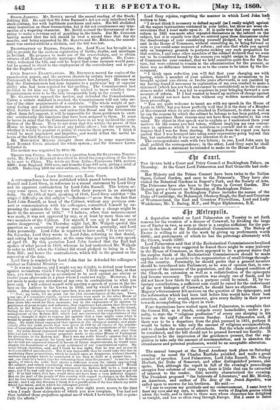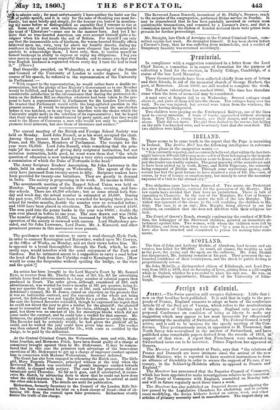Alttropolio.
A deputation waited on Lord Palmerston on Tuesday to set forth reasons for the creation of a diocese of Cornwall, by dividing the large see of Exeter in two, as soon as there is a surplus sufficient for the pur- pose in the hands of the Ecclesiastical Commissioners. The Bishop of Exeter is willing to aid in the work by giving up preferments worth 80001., and preferments of which he has the patronage alternately with the Crown, worth 25007. Lord Palmerston said that if the Ecclesiastical Commissioners localized their funds in the way suggested he feared there might be some jealousy in the House of Commons, as there appeared to be a general desire that the surplus funds of the Ecclesiastical Commissioners should be made applicable as far as possible to the augmentation of small livings through- out the country. Personally, he should prefer that a 1;enera1 measure should be introduced into Parliament, as he was of opinion that, in con- sequence of the increase of the population, and the changed condition of the Church, an extension as well as a redistribution of the episcopate had become necessary. The question was simply one of funds, and he did not know how funds for such a purpose could be raised. If, by vo- luntary contributions, a sufficient sum could be raised for the endowment of the new bishopric of Cornwall, he should have no objection. Her Majesty's Government felt anxious on the question of the episcopate, and the information which had been laid before him would have their best attention, and they would, moreover, give every facility in their power towards accomplishing the object in view.
Four deputations have waited upon Lord Palmerston, to complain that the Census Bill, as it stands, compels every householder, under a pe- nalty, to state the "religious profession" of every one aleeping in his house on the night of the census Sunday. Lord Palmerston said, if there was to be a departure from the plan pursued in 1861, perhaps it would be better to take only the amount of religious accommodation, and to abandon the number of attendants. But the whole subject should be considered, and the bill should not be pressed forward too hastily. It appeared to be the impression of the gentlemen present, that the sug- gestion to take only the amount of accommodation, and to abandoti the attendances and personal profession, would be an acceptable alteration.
The annual banquet at the Royal Academy took place on Saturday evening. As usual Sir Charles Eastlake presided, and made a great number of speeches. Lord Palmerston, Lord John Russell, Mr. Sidney Herbert., the Duke of Somerset, and other distinguished persons, also spoke. But, although the report in full of the evening's proceedings occupies four columns of close type, there is little that can be extracted of interest to the reader.. One novelty characterized the evening. The President proposed "the Interests of Literature," and Mr. Motley, an American, and author of The .nioe of the .ilutolt Republic, was called upon to answei for his brethren. He said :— "I rise to express my gratitude and my embarrassment. I casne here to feast my eyes and my ears, to admire the works of English genius which adorn the walls, and to listen to those men whose eloquence has delighted us tonight, and has so often rung through Europe. But I came to listen
to admire only; for most unfortunately I have neither the habit nor the of public speech, and it is only for the sake of thanking you most fer- vently, but most briefly and simply, for the honour you bestow in mention-
ing name before so distinguished an assembly that I venture to rise at Some one of your own illustrious authors should have responded to the toast of Literature '—some one to the manner born. And yet I be- lieve that no true-hearted American can ever account himself quite a fo- reigner when his foot treads the soil of Britain. For myself I can only say that the innumerable acts of kindness, the warm-hearted friendly, offices bestowed upon me, very, very far above my humble deserts, during my residence in this land, would require far more eloquent lips than mine ade- quately to acknowledge them, I have only, then, to confess myself an honest bankrupt in ability to express or repay my obligations. I bee you once more to accept my most respectful thanks, and to assure you that your
i
true English kindness s registered where every day I turn the leaf to read it." (Cheers.)
Earl Granville presided, on Wednesday, at a meeting of the Senate and Council of the University of London to confer degrees. In the course of his speech, he referred to the representation of the University in Parliament :—
" With respect to the representation, he would rather have a double re- presentation, but the pledge of her Majesty's Government as to one Member would be fulfilled, and had been provided for in the Reform Bill. He felt considerable satisfaction in the circumstance that during the protracted de- bates on the Reform Bill no objection whatever had been taken to the pro- posal to have a representative in Parliament for the London University. He trusted that Parliament would settle the long-agitated question in the present session. It would be imprudent in him to count the one chicken before it was hatched, or in any way to interfere with the choice which the University might make in the selection of its representative ; but he hoped that their choice would be uninfluenced by party spirit, and that they would send to the House of Commons a man who would not only be qualified to promote local interests, but also those of literature and science."
The annual meeting of the British and Foreign School Society was held on Monday. Lord John Russell, as is his wont, occupied the chair. Among those present were Lord Lyveden, Sir Walter Stirling, Mr. Pease, and Mr. Slaney, Members of Parliament. The receipts for the year were 23,305/. Lord John Russell, while remarking that the prin- ciple of the society, that of giving daily scriptural instruction, but not sectarian instruction, holds good, he must warn them that "the whole question of education is now undergoing a very strict examination under a commission of which the Duke of Newcastle is the head."
The Army Scripture Readers' Association, Sir John Lawrence in the chair, held its annual meeting on Wednesday. The agents of the so- ciety have increased from twenty-seven to fifty. Scripture readers have been provided for twenty-one battalions. They are greatly in demand in India. The society is progressing in its work. Its income is 89631.
The seventeenth meeting of the Ragged School Union was held on Monday. The society now includes 560 week-day, evening, and Sun- day schools. There are 49,290 scholars ; but as some attend both Sun- day and week day, the actual number is estimated at 25,000. During the past year, 870 scholars have been rewarded for keeping their place in school for twelve months, double the number ever so rewarded before ; and 1650 have been placed in situations. The shoeblacks earned 4548/. The sum paid into the penny banks in the year was 88001.; double the sum ever placed in before in one year. The sum drawn out was 7856/. The number of depositors, 25,637, has increased by 10,000. The whole operation of the society is crowned with success. Lord Shaftesbury pre- sided, and Sir John Lawrence, Lord Ducie, Mr. A. Kinnaird, and other prominent persons in this movement were present.
The gentlemen who are anxious to carry a road through Hyde Park, in order to connect Kensington and Bayswater, waited upon Mr. Cowper, at the Office of Works, on Monday, and set their views before him. He is opposed to a broad thoroughfare through the Park, which, he cor- rectly says, would interfere with the quiet enjoyment of the Park and Gardens. But he intimated assent to a suggestion to carry a road below the level of the Park from the Uxbridge road to Kensington Gore. [How would he cross the Serpentine without spoiling the bridge, or the view and the quiet
An action has been brought in the Lord Mayor's Court by Mr. Samuel Eyre, to recover from Mr. Thorley the sum of 30/. 15s. 6d. for advertising certain horse food advertisements in a large number of colonial papers then produced in Court. The order given, although considered at 10d. each advertisement, was worded for twelve months at 101. per quarter, being 5s. less per quarter than it would come to at 10d. each advertisement. The defendant's counsel, Mr. H. James, raised an objection on the grounds that it was an indivisible contract, and the execution of the whole not being proved, the defendant was not legally liable for a portion. In this view of the case the learned Recorder coincided, though he expressed his regret that he could not direct the jury to give a verdict for the plaintiff; the plaintiff must be nonsuited on that portion of his claim, although he ought to be paid, but there was an amount of 15s. for stereotype blocks which did not come under the contract, and he could take a verdict for that amount. Mr. Robinson, the plaintiff's counsel, applied to the Recorder to certify for costs. The Recorder said he certainly would ; he had given the plaintiff all he could, and he wished the jury could have given him more. The verdict was then entered for the plaintiff for 15s., with costs as certified by the Judge, to be paid by the defendant.
At the Central Criminal Court, the Welzensteins, man and wife, Made- leine Jourdan, and Hermann Frick, have been found guilty of a charge of conspiracy brought against them by Mr. Stohwasser. It may be remem- bered that in this ease the prisoners took advantage of the benevolent exertions of Mr. Stohwasser to get up a charge of improper conduct against him in connexion with Madame Welzenstein. Sentence deferred.
The Court has also been engaged in rehearing the Hatch case. The little girl, Mary Eugenia Plummer, principal witness at the trial when the Reverend Mr. Hatch was convicted of grossly improper conduct towards the child, is charged with peijury. The case for the prosecution did not terminate until Thursday. So far as it goes, and if unrebutted, it exone- rates Mr. Hatch, by advancing facts to show that he could not have done what the child imputes to him. But no conclusion can be arrived at until the other side is heard. The details are unfit for publication. Richardson, formerly- Secretary to the Council of the London Rifle Bri- gade, has been committed for trial on a fresh charge of fraud—that of ob- taining 10/. from the council upon false pretences. Richardson stoutly denies the truth of the charge.
The Reverend James Bonwell, incumbent of St. Philip's, Stepney, mush to the surprise of the congregation, performed divine service on Sunday. It may be remembered that he has been painfully involved in certain moat questionable transactions, and censured by a Coroner's Jury, and that a commission issued by the Bishop of London declared there were prime facie grounds for further proceedings.
Mr. Straight, late Clerk of Arraigns at the Central Criminal Court, com- mitted suicide last week. He strangled himself. It has been shown before a Coroner's Jury, that he was suffering from melancholia, and a verdict of Temporary Insanity was-returned accordingly.



























 Previous page
Previous page